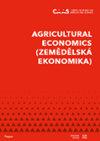模拟石油价格波动对高收入和低收入石油出口国粮食价格的影响
IF 1.8
4区 经济学
Q2 AGRICULTURAL ECONOMICS & POLICY
引用次数: 7
摘要
在日益动荡的宏观经济环境下,石油出口经济体受到最近油价冲击的打击最为严重。本文考察并比较了[危机前(2000年第一季度- 2013年第一季度)和危机期间(2013年第二季度- 2019年第四季度)]的子样本,以了解石油价格对高收入和低收入石油出口国食品价格的影响。基于高收入国家的完整样本和子样本,我们发现长期来看石油和食品价格之间存在反比关系。危机期间的情况有所不同:在低收入国家和所有国家的总和中,通过完全修正普通最小二乘(FMOLS)和动态普通最小二乘(DOLS)来衡量,石油和粮食价格在长期内是同步变动的。我们的研究结果表明,经济结构和不确定事件(危机)决定了食品和石油市场之间的行为和关系。食品和石油价格可能会在短期内波动,但从长期来看,市场力量会使它们趋于均衡。此外,低收入国家在这两个时期都无动于衷,因为它们平衡日益增长的粮食需求和供应的能力有限。本文章由计算机程序翻译,如有差异,请以英文原文为准。
Modelling the impact of oil price fluctuations on food price in high and low-income oil exporting countries
Oil exporting economies were the most hit by the recent oil price shock that spills on the food market in an increasingly volatile macroeconomic environment. This paper examines and compares sub-samples [before crisis (2000 Q1–2013 Q1) and during crisis (2013 Q2–2019 Q4)] as to the impact of oil price on food prices in highand low-income oil-exporting countries. We found an inverse relationship between oil and food prices in the long run based on full samples and sub-samples in high-income countries. The story is different during the crisis period: in low-income countries and all the countries combined, oil and food prices co-move in the long run as measured by the Fully Modified Ordinary Least Squares (FMOLS) and Dynamic Ordinary Least Squares (DOLS). Our findings suggest that economic structure and uncertain events (crises) dictate the behaviour and relationship between food and oil markets. Food and oil prices may drift away in the short-run, but market forces turn them toward equilibrium in the long-run. Moreover, low-income countries are indifferent in both periods due to limited capacity to balance the increasing demand for and supply of food items.
求助全文
通过发布文献求助,成功后即可免费获取论文全文。
去求助
来源期刊

Agricultural Economics-Zemedelska Ekonomika
Agricultural Economics & Policy-
CiteScore
4.30
自引率
4.50%
发文量
47
审稿时长
30 weeks
期刊介绍:
An international peer-reviewed journal published under the auspices of the Czech Academy of Agricultural Sciences and financed by the Ministry of Agriculture of the Czech Republic. Published since 1954 (by 1999 under the title Zemědělská ekonomika).Thematic scope:
original scientific papers dealing with agricultural subjects from the sphere of economics, management, informatics, ecology, social economy and sociology. Since 1993 the papers continually treat problems which were published in the journal Sociologie venkova a zemědělství until now. An extensive scope of subjects in fact covers the whole of agribusiness, that means economic relations of suppliers and producers of inputs for agriculture and food industry, problems from the aspects of social economy and rural sociology and finally the economics of the population nutrition. Papers are published in English.
 求助内容:
求助内容: 应助结果提醒方式:
应助结果提醒方式:


